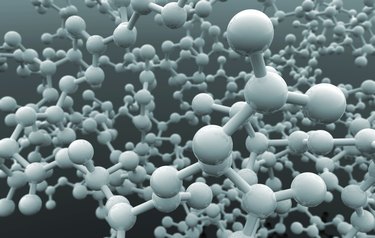
Whether you're trying to build muscle or lose weight, you may be adding more protein to your diet. While protein offers a number of benefits when consumed in adequate amounts, excess calories from protein are converted to body fat. If you're trying to minimize the accumulation of body fat, you need to pay attention to your overall calorie intake, not just protein.
Benefits of Protein
Video of the Day
At its most basic level, protein repairs tissue, makes hormones and enzymes, promotes immune health and preserves muscle mass, but it serves a purpose beyond these basic functions. Because your body has a limited amount of storage space for muscle-building protein, consuming high-quality protein at each meal may promote all-day muscle growth, according to a 2015 review article published in Applied Physiology, Nutrition and Metabolism. Protein is also satiating and may help aid in hunger management when reducing calorie intake for weight loss or weight maintenance.
Video of the Day
Excess Protein Calories and Body Fat
Although protein offers a number of health benefits, more does not equal better. If you eat more calories than your body needs from protein sources, the excess is converted to fat, albeit in a roundabout way. Protein is first metabolized into amino acids and ammonia. The leftover carbon compound is converted into glucose, which your body uses for energy. If your cells have enough glucose, and there is no space left to store it as glycogen in your muscles or liver, the excess glucose is converted into fat and stored.
Calorie Balance and Body Fat
Consuming more calories than your body needs leads to weight gain in the form of excess body fat, whether the extra calories come from protein, fat or carbs. The number of calories you need to maintain your weight and prevent further fat gain depends on your age, gender and activity, with estimates ranging from 1,600 to 2,400 calories for women and 2,000 to 3,000 calories for men. If you need to lose weight, reducing your current caloric intake by 250 to 500 calories a day may lead to a 1/2- to 1-pound weekly weight loss. To prevent a slowdown in metabolism, women should have a minimum of 1,200 calories a day, and men need at least 1,800.
Getting the Right Amount of Protein
To get the protein you need without going overboard, you should get 10 to 35 percent of your calories from this nutrient. Because of muscle breakdown and growth, athletes need 0.5 to 0.8 grams of protein per pound of body weight, while sedentary folks only require 0.4 to 0.5 grams per pound. Additionally, while protein powders and shakes may be marketed as beneficial for your workout or overall health, you don't need supplements. Instead, get your protein from quality food sources such as poultry, lean red meat, seafood, dairy, beans and nuts.
- American Council on Exercise: Will Eating More Protein Help Me Get Stronger?
- McKinley Health Center: Breaking Down Your Metabolism
- Biology: A Functional Approach; M.B.V. Roberts
- Applied Physiology, Nutrition and Metabolism: Protein: A Nutrient in Focus
- McKinley Health Center: Macronutrients: The Importance of Carbohydrates, Protein and Fat
- Diabetes Forecast: How the Body Uses Carbohydrates, Protein and Fat
- Centers for Disease Control and Prevention: Finding a Balance
- U.S. Department of Agriculture and U.S. Department of Health and Human Services: Dietary Guidelines for Americans, 2015 to 2020